MercoPress. South Atlantic News Agency
Stories for August 2nd 2012
-
Thursday, August 2nd 2012 - 22:57 UTC
Argentina’s noose on Falklands: Buenos Aires province bans UK flagged vessels
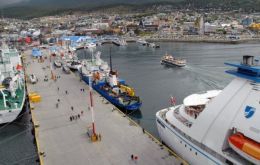
In what is seen as another step of Argentina’s noose-tightening of the Falkland Islands’ economy and development, the Buenos Aires Province Senate passed a law on Thursday banning British flagged vessels from calling at Argentina’s largest province ports.
-
Thursday, August 2nd 2012 - 07:38 UTC
Paraguay urges OAS to take a position on the country’s situation
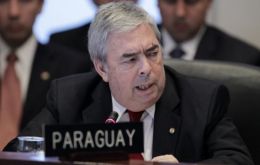
Paraguay urged the Organization of American States, OAS, on Wednesday to say whether it will be taking measures or not against the country following the removal of Fernando Lugo from the presidency, a political incident that has reverberated in the whole continent.
-
Thursday, August 2nd 2012 - 07:31 UTC
YPF after Chinese cooperation for development of Vaca Muerta shale deposits
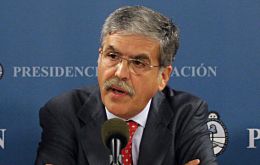
Federal Planning Minister Julio de Vido announced that several members of the Argentine Government would be flying to China in September in order to close several cooperation agreements between Chinese oil companies and YPF, intended to deepen the bilateral relations.
-
Thursday, August 2nd 2012 - 07:26 UTC
Argentina admits slower economy; blames global crisis, drought and Brazil’s low growth

Argentina acknowledged the slowing down of the economy as the result of the global crisis, prolonged drought and a lesser growth rate from Brazil, according to a report from the Central Bank released this week.
-
Thursday, August 2nd 2012 - 07:20 UTC
IMF praise for Brazil’s financial system but warns of home-grown risks

Thanks to sound policies and built-in cushions, Brazil’s financial system weathered the global crisis that began in 2008 remarkably well, but now policymakers need to monitor for signs of home-grown financial trouble, the IMF said in its later report.
-
Thursday, August 2nd 2012 - 07:08 UTC
Chilean opposition remains divided ahead of October municipal elections
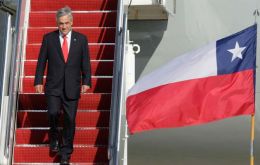
Chilean opposition registered its candidates at the Electoral Service for the coming municipal elections in October but was unable to reach an overall agreement to face the ruling conservative parties.
-
Thursday, August 2nd 2012 - 07:04 UTC
Massive capital outflow in Spain: €163 billion left in five months

Capital outflows from Spain more than quadrupled in May to €41.3 billion compared with May 2011, according to figures released on Tuesday by the Spanish central bank. In the first five months of 2012, a total of €163 billion left the country, the figures indicate. During the same period a year earlier, Spain recorded a net inflow of €14.6 billion.
-
Thursday, August 2nd 2012 - 06:59 UTC
Argentina on track to become world’s fourth largest producer of poultry meat

Industry Minister Debora Giorgi said that Argentina is on track to become, in the short term, the fourth largest producer of poultry meat. According to the Industrial Strategic Plan 2020, the sector achieved in less than a decade exports of 600.000 tons per year.
-
Thursday, August 2nd 2012 - 06:53 UTC
Brazilian government to the rescue of pork farmers; excess production
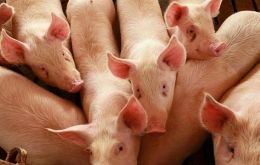
The Brazilian government will spend 30.4 million Reais (15.05 million dollars) to buy 76,000 metric tons of excess live swine, through a minimum-price plan created to help Brazilian producers get out from under a national oversupply of pork, the Ministry of Agriculture announced.
-
Thursday, August 2nd 2012 - 06:46 UTC
The next December solstice celebration in Bolivia will have Coca Cola after all

Bolivia said on Wednesday that statements from Foreign minister David Choquehuanca about “the end of Coca Cola” were taken out of context adding there are no plans to expulse the US Company from the country, as published in the local media.
